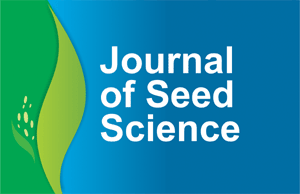The production of seeds and seedlings by these species is of utmost importance to prevent a loss of biodiversity of the Caatinga, a unique and exclusively Brazilian biome. Biosaline agriculture is conducted over a range of salinity levels in groundwater and/or in soils. The current study evaluated the application of biosaline agriculture to Anadenanthera macrocarpa, Myracrodruon urundeuva, Aspidosperma pyrifolium and Erythrina velutina by examining the germinative metabolism of seeds subjected to different electrical conductivities (ECs) of NaCl solutions and biosaline water. The seeds were germinated in biosaline water (4.94 dS.m-1) and in NaCl solutions with ECs of 0, 2, 4, 6, 8, 10, 12, 14, 16 and 18 dS.m-1 at 25 ºC, 12-h photoperiod. The kinetic variables of germination were assessed, and the seeds and seedlings were assayed for reserve biomolecules, proline content and antioxidant enzyme activity. The seeds were highly tolerant to salinity, with germination-limiting ECs above 12 dS.m-1. Although high EC promoted alterations in seed metabolism that enabled salinity tolerance, seedling production was indicated with ECs no higher than 6 dS.m-1. These results demonstrated that Caatinga seedling production is viable through biosaline agriculture beucause the groundwater salinity of this region is within the tolerance levels of the seeds.
antioxidant enzymes; germination; reserve mobilization; salt stress
